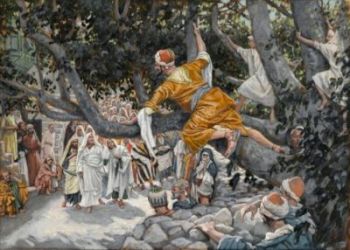
Suppose someone has an advanced stage of cancer and, among other side effects, it is causing skin blotches. And suppose the doctor focuses on covering up the blotches so that no one will know the person has cancer; he postpones the cancer treatment for another time. What kind of doctor would focus on the symptoms of cancer and not treat the disease?
Jesus came into a world of people living in an advanced stage of spiritual cancer. The religious leaders of the day, unable to heal the disease, created a complicated system for covering up the symptoms. Jesus, the true physician, directed his attention to the disease.
We see this in today’s gospel reading (Luke 19:1-10).
“At that time Jesus came to Jericho and intended to pass through the town. Now a man there named Zacchaeus, who was a chief tax collector and also a wealthy man, was seeking to see who Jesus was; but he could not see him because of the crowd, for he was short in stature. So, he ran ahead and climbed a sycamore tree in order to see Jesus, who was about to pass that way. When he reached the place, Jesus looked up and said, ‘Zacchaeus, come down quickly, for today I must stay at your house.’”
Jesus had no plans to stay at Jericho; he was just passing through. God had different plans for him. The little tax collector sitting on the branch of a sycamore tree caught Jesus’ attention. Ignoring the rest of the crowd, Jesus focused on Zacchaeus. He interrupted his travel plans to reach out to the worst sinner in town. Not only did Jesus speak to the little man, he also invited himself to dinner at his house. What a scandal this was! Devout Jews were not allowed to enter the house of a sinner.
“And he came down quickly and received him with joy. When he saw this, they began to grumble, saying, ‘He has gone to stay at the house of a sinner.’”
The people were horrified. Everyone knew that Zacchaeus was an enemy of God and the people. His Roman connections cut himself off from the religious community. The people hated this man, and for good reason. How could Jesus be a man of God and dare befriend this tax collector and even spend a day at his house?
“But Zacchaeus stood there and said to the Lord, ‘Behold, half of my possessions, Lord, I will give to the poor, and if I have extorted anything from anyone I shall repay it four times over.”
He stood his ground and made a public confession. On the spot he repented of his sins and promised restitution.
“And Jesus said to him, ‘Today salvation has come to this house because this man too is a descendant of Abraham. For the Son of Man has come to seek and save what was lost.”
Jesus brought salvation not to the “righteous” people of town but to the one who least deserved it. Rather than address the symptoms of the disease that everyone shared in, he went straight into the cancer and healed it. Everyone there needed the gift of salvation that Jesus brought, and it was only the worst sinner who received it. When he looked at Zacchaeus, Jesus saw beyond his sinful lifestyle into his buried identity. He too was a child of Abraham and deserved the promises given to his father.
Though religious practice is important, it is not a substitute for salvation. If religious practice is confused with the gift of salvation, it can become a covering up of the symptoms rather than a treatment of the disease.
If Jesus’ saving power can heal the heart of a sinner like Zacchaeus, then there is no one out of reach of his help. We go to the doctor, not to prove we are healthy, but because we are sick.
As we sit in the sycamore tree watching Jesus, let us hope he asks to stay in the house of our heart today.
